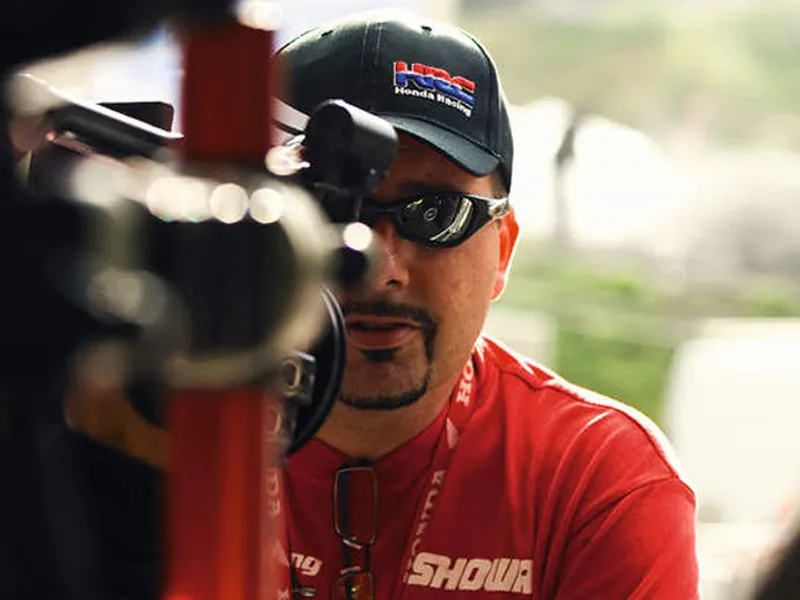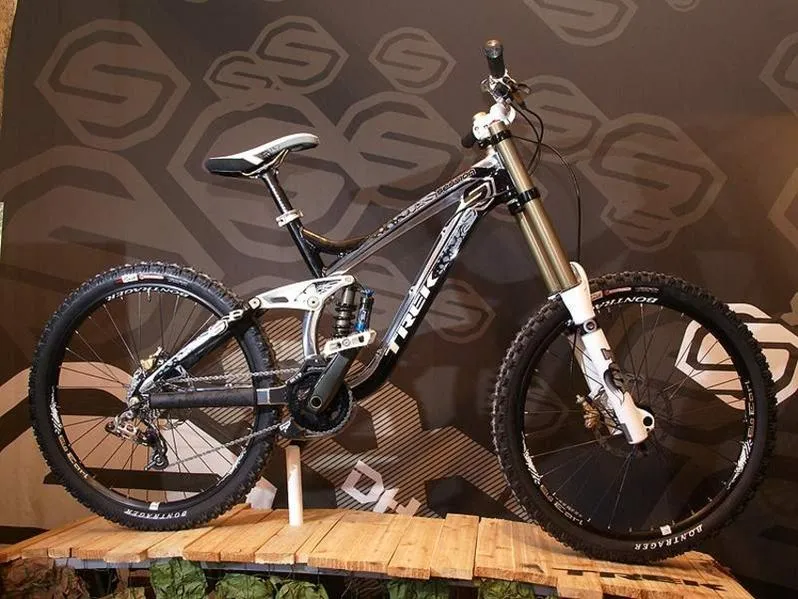Former downhill racer Martin Whiteley now manages some of the world's best riders through his company 23 Degrees Sports Management as well as being an International Cycling Union (UCI) official.
He's the team director of the new Trek World Racing (TWR) squad which, with riders of the calibre of Tracy Moseley, Justin Leov and Andrew Neethling on the downhill side and Liam Killeen, Lukas Flueckiger and Matthias Flueckiger for cross-country, looks set to shake up the World Cup scene.
We spoke to Martin about his involvement with Trek, the end of Team G Cross Honda, the future of mountain biking and who he reckons will be the next big thing.
BikeRadar: The launch of the new Trek World Racing team marks a major return to the World Cup circuit by a company which has been pretty quiet, on the racing front, for a few years. What do you want the squad to achieve in their first year?
We’ve been quite deliberate about the riders we went after for this team, choosing those who we think are on the ascendancy or will greatly benefit from the amazing equipment that Trek are producing. It’s not unrealistic for us to be challenging for the UCI World Cup team trophies in downhill and in men’s cross-country.
We’d love to help Tracy win a World Championship on a track she proved to like last year, as well as help Mathias win an under-23 world title. Liam and Lukas both have shots at major race wins this year, and both Justin and Andrew are keen to stand on top of the World Cup podium.
We’ve got quite a few goals, but these are the standout competitive ones. The more we can achieve in that department, the greater chance we have of generating significant press for our sponsors.
Why did you pick these particular riders, and why do you think they’ll work well as a team?
In my view, having a team with top level riders in both disciplines requires riders of a very similar mentality. I needed downhill riders who have the same commitment to training and developing as athletes as the cross-country riders.
I wanted a cohesive team where one discipline is out there supporting the other if it’s racing, and we also wanted riders who were extremely professional and great ambassadors for the sport, and of course Trek and our other sponsors.
What is it like for you managing a team again after the abrupt end of the Honda squad in 2007?
The end of Team G Cross Honda may have seemed abrupt to many, but we always knew its days were numbered as it would soon serve its purpose. Therefore, I was always thinking of a new programme and to be ready for the next challenge. I wanted to run a multi-discipline team and when I saw what was coming out of Trek’s suspension lab, it was clear that they were making impressive machinery for both cross-country and downhill.
We began talking about this some time ago – most of 2008, from Sea Otter onwards, was spent planning for this new TWR project – so in a way, I don’t feel like I’ve been out of the game. I am keen to get back on the road though, and present this exciting new program.
What’s the score with the team videographers, John and Rob Parkin, the British pair behind last year's 3Focus DVD. What are you hoping for from them?
Since September 2007 when I put out my last post-race report, there has been a huge expansion in the video medium for mountain biking. Freecaster and teams like Yeti made this a success in 2008, and I just feel that most of our target market and the world of YouTubers would much rather watch a video release than a written press release. We’ll do both, and continue to have still images, but with our own in-house videographers we can be a lot more creative in getting the message across, for both cross-country and downhill.
I've been really impressed with John and Rob Parkin’s evolution over their last three movies. I worked with them on their first movie, so I’ve known them for a while… and the 3Focus movie is excellent, especially the Justin Leov and Sam Blenkinsop segment, really amazing. So we’re pretty stoked to have them working for our team, and their videos will be up on our new website, launched on 8 April, at www.trekbikes.com.
Also in-house will be a dedicated Fox Racing Shox technician, Justin Frey, who’ll work inside our tech area at major events, dedicated to TWR. If there’s one thing I learned from Honda, and having [suspension specialists] Showa in-house, it's that the greater the level of support for the riders inside our own walls, the bigger the difference in results and reliability.
You're not just team director of TWR, you also have your own firm, 23 Degrees Sports Management. What exactly does your company do?
We’re a secretariat for the riders. We handle sponsorship contracts, invites to promotional races and events, help with their interviews and look after websites, as well as working on their media profile in many national markets. I speak four languages so that helps with contacts overseas. We also advise on other issues like race season strategies, off-bike professionalism and so on.
What’s with the number 23?
That could take up the entire interview, but if anyone’s seen the movie Number 23 with Jim Carrey, it’s kind of like that but with a little less mania. It’s a number that’s been ever present in my life – maybe through coincidence or whatever – but it became my race number, then a nickname. It seemed logical to name my company after the fact that the world does actually spin on an axis of 23 degrees. There’s a lot more to it, but that’s for another day.
Why sports management?
I was always a lot better at admin than I was at racing downhill, and I found that most top-level downhill racers are way better at racing than handling admin! It looked the perfect way for me to continue working in a sport I live for, and to help riders I really respect.
What do you look for in an athlete?
A combination of skill on the bike, their attitude and actions off the bike and at parties. I’m not keen to manage someone I’ve got to get out on bail every three weeks. When I go to sponsors with my list of athletes, I want to believe in each and every one of them, and know that they represent 23D and their sponsors in a professional way. Riding style is important for me, but more important is their ability to grow as a professional rider in all areas, not just results.
Do athletes approach you, or are you a headhunter?
There are always athletes reaching out to us, but riders are usually on my radar for a year before I make contact. I’ve only once signed an athlete who came to me.
Have you ever had reservations about the riders you manage?
Sure, that’s not unusual, but more in the sense that I have reservations about them not reaching their potential – there’s always a risk of them getting distracted along the way. You do have to be mindful of what other factors are playing out in their personal lives.
How do mountain biking athletes compare to other professional sportsmen?
There’s not a huge difference. I’ve hung around racing drivers and Moto GP riders, as well as road cyclists, and they all have pretty much the same issue of trying to make the most of their window in the limelight without making personal compromises on who they are and what they stand for.
What are your views on downhill mountain biking not being in the Olympic Games?
I still don’t think that having cross-country in the Olympics has radically changed the face of the sport yet – it’s still seen as a ‘lesser’ discipline than road cycling, although it does bring in more government and national federation support, as well as media and sponsor attention one year in four.
The single biggest issue downhill or 4X have for inclusion in the Games is that they need other cycling disciplines to go off the program in order to make way for them. The UCI gets allocated a predetermined quota of athletes by the IOC (International Olympic Committee)… let’s say that’s 540. That’s made up of road, track, mountain bike and now BMX athletes. If you want to add 50 downhill riders, you need to subtract 50 track, road or BMX riders. Not an easy task.
I think the IOC looks at events like the X-Games and sees that in order to be relevant to a new audience, it doesn’t hurt to have snowboarding, BMX and so on in their Olympic programs, so if the opportunity to include downhill comes along, we should take it… but not count on it.
For riders at a base level, can you advise on how they can advance?
It’s not a chicken and egg scenario. Sponsorship comes after results, which come after dedication, investment and raw talent that we don’t all have. If an athlete has the talent, and some understanding parents, then it’s up to the rider. If they have it, they’ll get noticed and picked up.
They need to stay true to who they are, but also learn how to improve their communication skills – both with media and potential sponsors.
For the most part, remember that it’s a very exclusive club and only a select few have the whole package. Downhill riding is still heaps of fun, and should be enjoyed first and foremost – don’t give up the sport just because someone isn’t throwing bikes and cheques at you after your first race season.
How important is it for us to look outside the industry for it to keep progressing?
It’s absolutely vital. Without investment from external companies and dollars new to our industry, we’re just spending the money our fans and industry consumers spend on our bike company sponsors. It can become a stagnant pool which isn’t healthy.
Would you say working with [current downhill world champion] Greg Minnaar is your biggest success?
Success? It has certainly been very rewarding on a personal and professional level. I think Greg has created most of his success though – I’ve just been a guide along the way. To be still working together as closely as we do, in our 12th season, is a form of success, yes.
Having Honda come along and participate in the World Cup was a big deal for me too, but I think my biggest success is keeping a small company afloat for eight years despite economic downturns and huge currency fluctuations… any small company owner will tell you that!
Who’s the next big thing?
There are just so many names: Josh Bryceland (GBR), Aaron Gwin (USA), Luke Strobel (USA), Arran Gannicott (GBR), Joe Smith (GBR), Dennis Dertell (SWE), Sam Dale (GBR), Stevie Smith (CAN), Remy Thirion (FRA), Aari Barrett (NZL), Brook MacDonald (NZL). A lot depends on their personalities. I only know half of these riders personally though.

